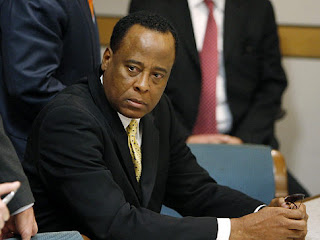Partly because of the celebrity of the victim and partly because of the use of cameras in court, the current trial of Dr Conrad Murray for the Manslaughter of Michael Jackson is generating a vast body of evidence for students to mull over.
It provides an opportunity not available in our legal system for them to get to grips with the processes of a trial and the concepts of Involuntary Manslaughter. It’s the perfect source material for a Mock Trial.
The case merits comparison to our own leading case of Adomako [1994] and, although American law is not exactly the same as English law, their crime of ‘criminally negligent manslaughter’ neatly equates with our own crime of ‘gross negligence manslaughter’.
In Adomako [1994] a distracted anaesthetist failed to realise that his patient had become disconnected from the oxygen supply for several minutes. This had fatal consequences. The House of Lords judgment became the leading case on gross negligent manslaughter. There are some obvious parallels with the Jackson trial.
The Key Elements from Adomako:
- Was there a duty of care?
- Was this duty breached?
- Did the breach cause death?
- Were the acts and omissions of the defendant so bad in all the circumstances as to amount to a criminal act or omission?
It is not difficult to show a duty of care between the doctor and his patient. The other elements form the contentious parts of the trial. I’ve divided them up below.
Activity Stage One:
Divide the group into two halves and allocate a research question to each half.
Research Question One: Causation
Examining the evidence so far, is it fair to say that Conrad Murray’s acts or omissions caused the death?
Students might consider:
- How did the combination of different drugs find their way into Michael Jackson’s system?
- Was the quantity and combination of drugs medically justified?
- Were they administered solely by Dr Murray?
Research Question Two: ‘Grossness’
Was the breach of duty so bad in all the circumstances (per Adomako [1994]) as to be classed as criminal?
Students might consider:
- Did Conrad Murray breach his duty in his choice of medication and his advice to the patient?
- Did he monitor his patient properly?
- Did he take appropriate steps to seek help once he had noticed the difficulties his patient was in?
- Was it anyone else’s responsibility to look after Michael Jackson?
Activity Stage Two:
Convene new groups containing an even mix of the two research questions.
Re-allocate roles as Prosecution and Defence and let battle commence!
Research:
Any news site search will generate huge volumes of material but here are 2 useful starting points.
http://www.bbc.co.uk/search/news/conrad_murray
http://www.reuters.com/search?blob=MJ+TRIAL
Nigel Briggs
Head of Law
Notre Dame Sixth Form College Leeds



